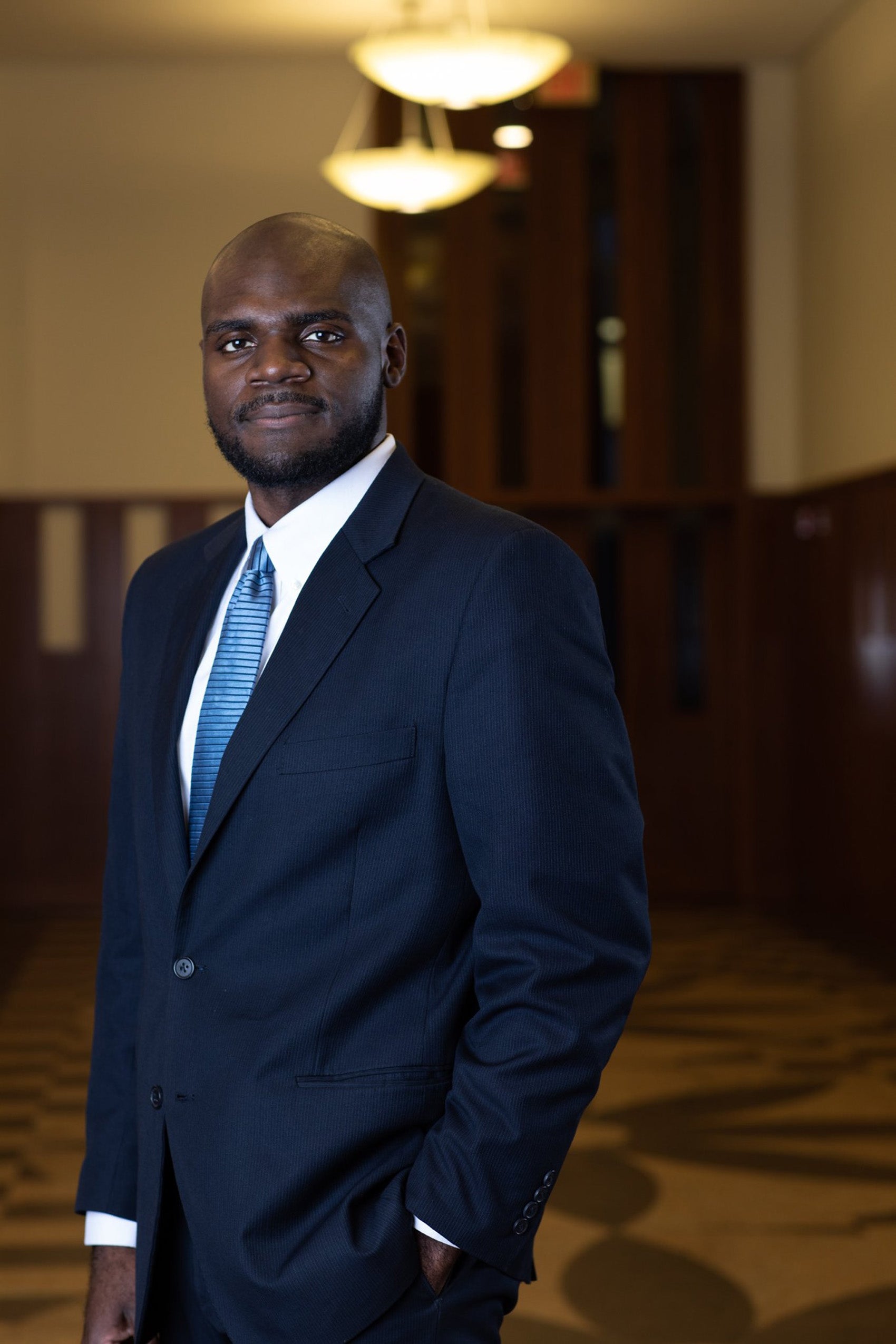The winner of the inaugural Gants Access to Justice Award is Dennis Ojogho ’21. Recognized for his exemplary work in housing law with the Harvard Legal Aid Bureau (HLAB), Ojogho helped build partnerships with marginalized communities and their organizers through his advocacy with City Life/Vida Urbana (CLVU), a longtime partner organization of HLAB.
This new award honors the late Massachusetts Supreme Judicial Court Chief Justice Ralph D. Gants ‘80, who passed away in the fall of 2020 and was a tireless advocate for racial and social justice. The award recognizes a student who, in the spirit of Justice Gants’ commitment to creating a fair criminal justice system, is dedicated to advancing access to justice, racial equity and/or criminal justice reform and has demonstrated leadership in helping to eliminate systemic barriers to justice.
Ojogho traces his interest in access to justice to his experiences before law school, when he was a youth organizer in his hometown of South Central Los Angeles. There, he helped high school student leaders advocate for increased equity in school funding decisions and restorative approaches to juvenile justice. Ojogho soon found that there was a limit to how much progress could be won for inner city schools without taking economic justice, particularly property taxes that benefit wealthy corporations, into account.
“Seeing the connection between property taxes and educational funding as an organizer was a paradigm shift in my thinking,” he said. “Education justice requires economic justice, and economic justice requires stable housing. Stable housing is a foundation for a stable job, stable health, and stable civic participation. Thus, I decided to join HLAB and work with CLVU in order to gain a better understanding of how housing law and policy intersect with economic justice.”
LISTEN: Dennis Ojogho talks about his work with HLAB and City Live/Vida Urbana at a community meeting in 2019.
At HLAB, Ojogho had the opportunity to represent clients in a large number of complex eviction cases. He sustained client tenancies through mediations and negotiated new lease agreements with landlord attorneys. In his 2L year, he was part of a three-student attorney trial team that won a jury trial that prevented the displacement of 15 to 20 individuals. Ojogho’s work was critical to the team effort — he prepared his clients to testify, conducted direct and cross examinations, and played an important role in arguments at side bar. The case culminated in a five-year lease for all tenants in the building along with renovations.
Notably, in his 3L year, Ojogho worked on a case that involved a complicated appeal for a disabled tenant who had been ordered evicted by way of an illegal judicial process. The case raised novel legal issues regarding Massachusetts eviction procedure, contempt proceedings, and reasonable accommodation law. Ojogho single-handedly drafted the appellant brief, reply, and delivered the oral argument at the Massachusetts Appeals Court. He was able to secure a victory for his client that reversed the eviction order and also set favorable disability law precedent.
Ojogho said the moment he called his client to deliver the news was one of the most memorable in his HLAB experience. “To hear the joy in his voice at the news was the best possible reward I could have received for all the hard work that went into briefing and arguing his case. It is a memory I will cherish forever,” he said.
“Dennis’s success in his HLAB cases is not only based on his superior work ethic and intelligence, but also on his character,” said the faculty and staff at HLAB. “He has a moral clarity and an integrity that is obvious even to the most casual observer. As such, he is a quiet force who is effective as an advocate in ways that cannot be taught. It also makes him an incredible colleague and team player.”
In addition to his clinical casework, Ojogho served as outreach director for HLAB and was responsible for overseeing the clinic’s community partnership in all areas of practice. In this role, he adapted and maintained the clinic’s community lawyering model throughout the changes brought about by the pandemic.
“If law school is meant to teach you how to think like a lawyer, then my clinical and pro bono work taught me how to actually be a lawyer,” he said of his law school experience. “The practical experience that I got in HLAB over the last two years sounds too good to be true for a junior attorney, let alone a student advocate … These experiences have been invaluable for my development as a new attorney and I will always be grateful to HLAB for putting me in a position to help those who could not otherwise afford to have an attorney in the Boston Housing Court.”
Beyond his clinical work, Ojogho served as the political action committee co-chair of the Harvard Black Law Students Association, where he worked closely with organizers at Reclaim Roxbury, a grassroots housing justice organization, in providing legal research to support their anti-displacement efforts. He also served as editor of the Harvard BlackLetter Law Journal.
As a new graduate, Ojogho reflected on what would inspire him as a new lawyer.
“CLVU has a saying, ‘When we fight, we win!’ Time and time again through my work with CLVU and HLAB, that saying has been proven true. And it is that ethos that I will take with me as a new lawyer. No matter how difficult any case may seem, no matter how unfavorable the odds, I will always remember to keep on pushing for the causes I believe in — because those that fight, win.”
Ojogho will join Latham & Watkins as an associate this coming fall and, the following year, he will serve as a clerk for Judge Denise Casper of the U.S. District Court for the District of Massachusetts.
